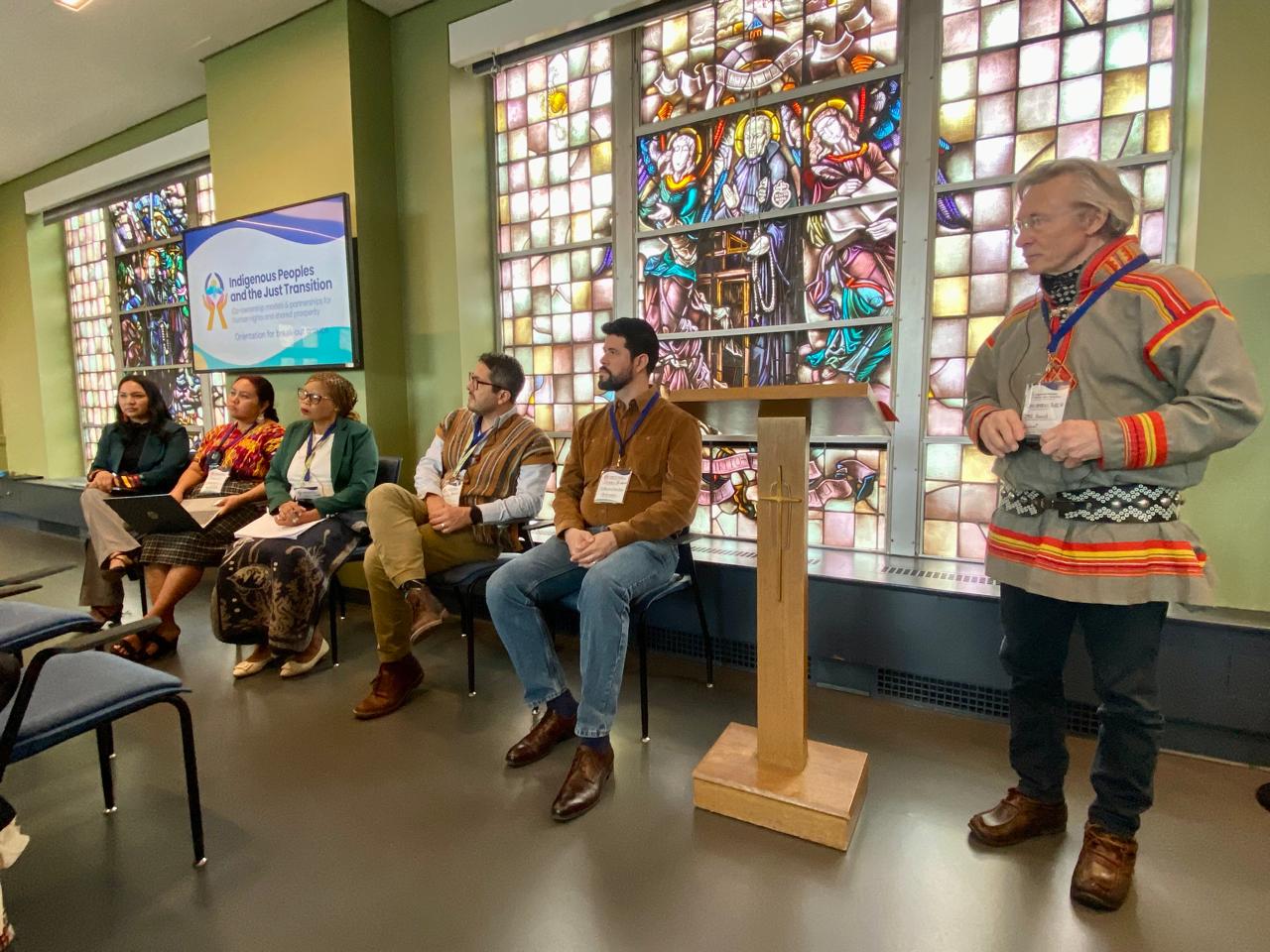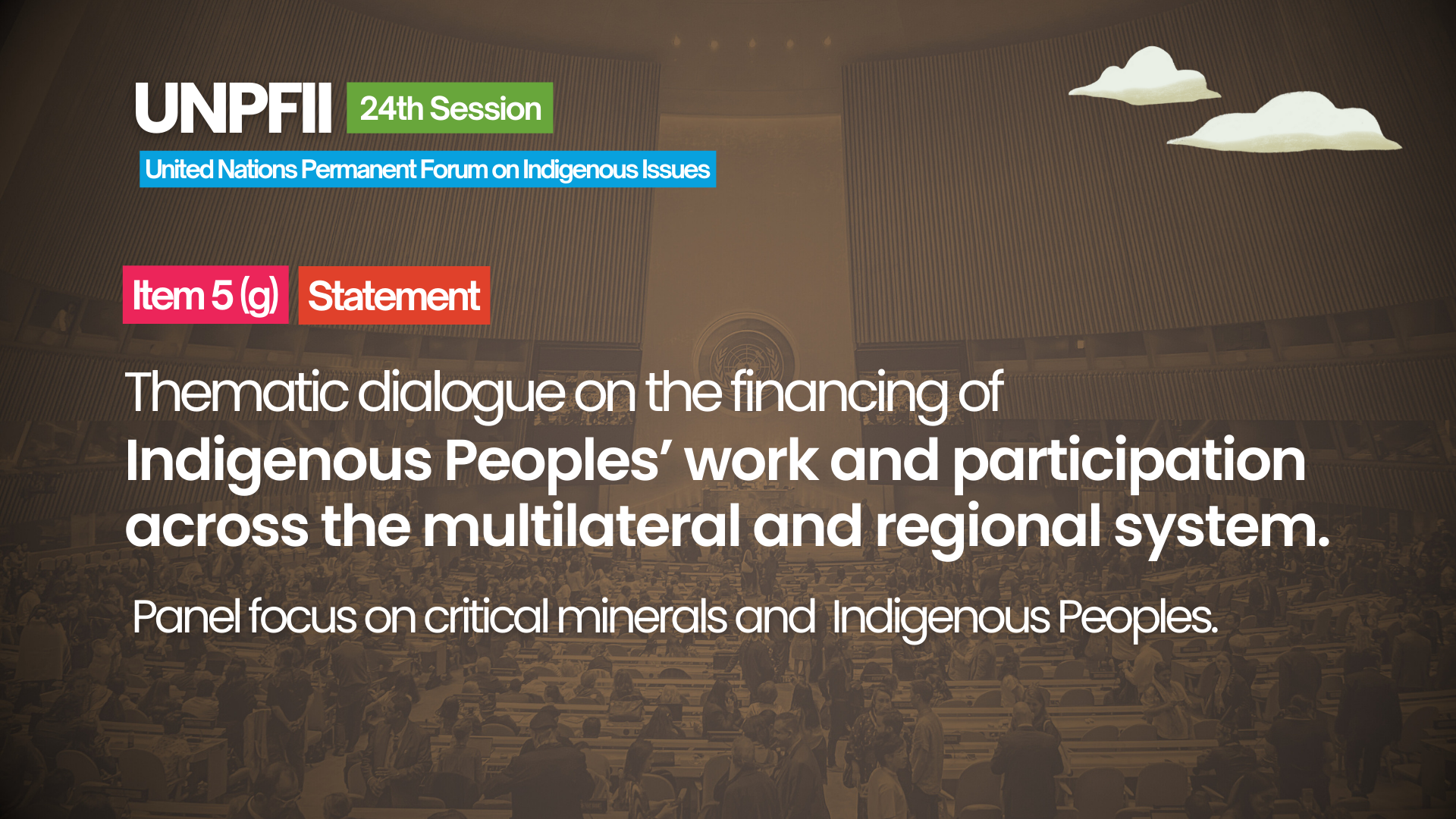On April 13, the more than 100 participants of the conference "Indigenous Peoples and Just Transition" focused on discussing models of shared prosperity in clean energy projects and the challenges they face.
Alancay Morales, IPRI's Business and Human Rights Leader, began by noting that the pillars for a just transition are human rights, social protection, fair negotiations and shared prosperity. He also highlighted as indispensable technical and financial support, that shared prosperity should reach more than 50% of indigenous peoples and that the process of free, prior and informed consent should be carried out.
Matshwenyego Josephine Ntshipe, an indigenous woman leader from Botswana, noted that renewable energy projects have had impacts on her peoples that include cultural loss, no shared benefits, and many do not even have electricity service. From his experience, best practice recommendations are to have a strong advocacy group, train the community and demand laws that protect their rights. Likewise, that no project that has not complied with Free, Prior and Informed Consent should be allowed to move forward and that indigenous ownership of energy projects should be increased.
Isabel Cuxé Prir, a Mayan woman from Guatemala who belongs to the Madreselva organization, presented her experience with community mini-hydroelectric plants. With 6 micro-hydroelectric plants built for property and social benefit, the activist said that this project has contributed to boosting economic activity, benefiting education and health and empowering the community, all while using only 15% of the flow of the rivers. It has been a challenge to enable women to become partners and train them, she said. And among the lessons she said: prioritize projects with community organization and a greater number of users, strengthen previous studies, and count on legal accompaniment and constant training.
Monica Paradise, from Tribal Liaison Western Region - Alliance for Tribal Clean Energy pointed out that there is no single definition of Just Transition. From her experience, she added, indigenous-owned clean energy projects have allowed them to maintain a healthy ecosystem and support other community efforts, as well as help heal historical trauma through job creation and the provision of essential services. "It's an opportunity to be impuslores," he stressed.
James Jenkins, executive director of Indigenous Clean Energy Canada, noted that external energy projects have brought relocations and loss of heritage for indigenous peoples. In the new landscape, indigenous participation in clean energy projects - solar, wind, hydro, biomass, biomass, efficient homes and energy storage - has reached 20% in Canada. In this case, the impetus for such projects comes from federal funding and favorable provincial legislation.
Pichamon Yeophanton of the UN Working Group on Business and Human Rights gave a presentation on the UN Guiding Principles on Business and Human Rights.
Melina Laboucan-Massimo, founder and executive director of Sacred Earth Solar, invited people to download her organization's manuals to learn more about the differences between models for shared prosperity projects, such as cooperatives and community-driven models. She emphasized that in these types of projects, the profits go back to the community and benefit it, for example with the financial ability to buy fire trucks or establish parks, schools, water. "The money stays in the community," he summarizes.
Prabindra Shakya, founder and director of Community Empowerment and Social Justice Network warned that some governments, such as the Nepalese government, use benefit-sharing agreements with indigenous communities as a substitute for Free, Prior and Informed Consent. He also criticized that in some of these models, the benefits do not reach the people most affected. For projects to be fair, communities demand respect for FPIC throughout the project cycle and to prioritize indigenous peoples in the benefits. In addition, benefits should be collective, not individual. The idea, he said, is models led by small- and medium-scale indigenous people in partnership with companies and the public sector.
Ruth Kissam, of the Papua New Guinea Women Leaders Network, pointed out that 97% of the land on her island is indigenous property. She defended the right of the tribes to carry out extractive activities, as they are basic to their economy.
Wikitoria Hepi-Te Huia, president of the Tauhara North No. 2 Trust, pointed out that the communities decided that a geothermal power plant should be built on their land - which is obliged to comply with due diligence and the Maori Land Act. Today, the indigenous people own 35% of the station and the profits are dedicated to community development.
Los participantes en la conferencia continuaron con el trabajo de discusión en grupo, que se plasmará en la construcción de una Declaración y una Hoja de Ruta de la Conferencia.
La conferencia se celebra del 12 al 14 y el 17 de abril, y está organizada conjuntamente por Right Energy Partnership with Indigenous Peoples (REP), el Business and Human Rights Resource Center (BHRRC) y la Indigenous Peoples Rights International, con el patrocinio del PNUD y el apoyo de Nia Tero, The Christensen Fund, Henry Luce Foundation, Waverley ST Foundation y el Columbia Center on Sustainable Investment.





